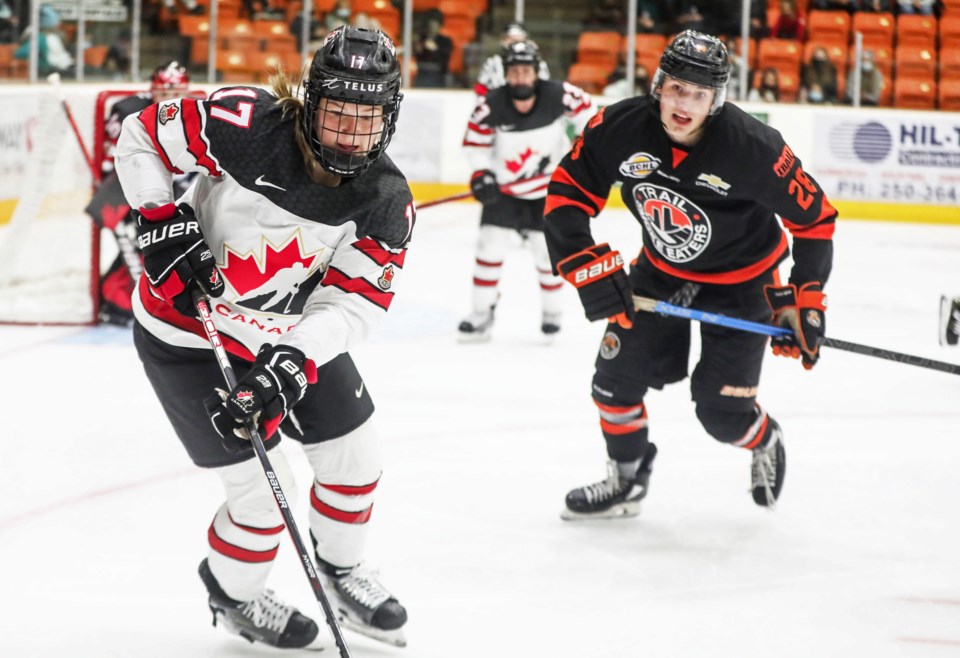The Canadian women's hockey team was pushed out of its comfort zone in pre-Olympic preparation. The players didn't always like it.
Regular games against male triple-A hockey teams became a standard part of Canada's "centralization" starting in 2006.
Skating, passing and making decisions in high gear was an effective means of getting the Canadian women ready to play archrival United States in the Olympic women's tournament.Â
The women went a combined 58-46-5 against triple-A clubs ahead of the 2006, 2010, 2014 and 2018 Winter Games.
Hockey Canada upped the ante for 2022. The women played five games against men's Junior A clubs in Alberta and B.C.Â
Canada was swept and outscored 30-2, which stung.
"The one thing about this group is you don't have to read it in their face, because they'll tell you," Canadian head coach Troy Ryan said. "They just straight up told me 'this is difficult' and 'we don't see the point right now.'"
The men reined in body checking, which is a minor penalty in international women's hockey, but there was still body contact. The men's height, weight, speed and reach a step up from triple-A was a handful for the women.
"You lose by big numbers, you ask yourself if we're doing the right thing, but after taking a step back, you have a couple meetings, you see what we do well," Canadian captain Marie-Philip Poulin said.
"The angling, the stickwork we have to do against these boys to be able to keep up with them is something we've introduced in our game. The big picture is tough to see when you lose by seven, eight goals.
"Our angling the first couple games against those guys, they were just blowing by us. That's what centralization is all about. It's adversity. How are we going to come of it?"
Establishing offence was the priority when 29 women gathered in Calgary in July ahead of the women's world hockey championship.Â
After taking the title Aug. 31 with a 3-2 overtime win over the U.S., Ryan felt it was time to dig into playing without the puck, which Junior A games certainly provided.
"It's easy to come back after one or two of those junior games and say 'here's a couple defensive concepts we've got to work on,'" the coach explained. "It's fresh in their mind. It's obvious we need to work on it."
Canada played Junior A opponents three times before this winter. Goaltender Shannon Szabados made 52 saves in Canada's 3-2 win over the AJHL's Calgary Canucks on Dec. 5, 2009.
Canada split a pair of Maritime Junior Hockey League games in September of 2019, when the women lost 4-2 to the Valley Wildcats and downed the Pictou County Crushers 4-1.
A sixth Junior A game Jan. 10 against the Canucks was called off because of a COVID-19 outbreak on the women's team.Â
Canada lost 2-0 to the host Camrose Kodiaks on Nov. 3 in the closest game of the five.
"What the women got out of the game was really good competition," Kodiaks coach Clayton Jardine said. "It's hard because the only team that's at their level they can play is the women's American team.
"For us, it really opened our eyes to how skilled they are. How they defend with their stick and with their skates is something we try to teach because the hitting in hockey on the male side is going away and it's becoming a skilled hockey game.Â
"Their stick placement and their details of how they defend, because they're not allowed to hit, is something we really learned and something I still talk about to this day when we don't have the puck on our stick."
A few Kodiaks were nervous about running a woman over and injuring her, he added.
"We had one guy who hit a girl twice and the girl slashed him back," Jardine said. "The guys knew who these girls were. As soon as the game ended, they all wanted pictures with certain players."
Hockey Canada director of national women's hockey teams Gina Kingsbury won Olympic gold with Canada in both 2006 and 2010, and thus knew how much triple-A games contributed to those titles.
Junior A opponents felt like a next-level progression to her, and the test those games provided was a factor in the selection of the 23-player Olympic roster.
"We want to put our athletes in uncomfortable situations," Kingsbury said. "I think we did so from a mindset perspective and certainly from a performance and physicality standpoint.
"A lot of people can just look at the score and say 'that was useless. That was pointless.' For us, it's not about the score. It's about the details we pull out of those games.
"We look much different in our defensive zone even than we did a year ago. We know how to be successful. If we can be successful against these boys, there's no doubt we'll be successful against the Americans."Â
This report by The Canadian Press was first published Feb. 9, 2022.
Donna Spencer, The Canadian Press

